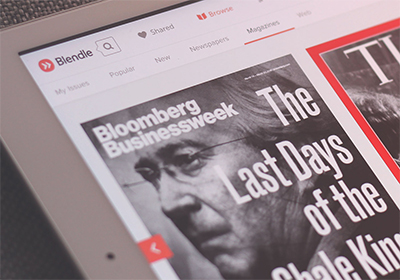 Dutch company Blendle launches stateside this month, offering publishers a different way to share content and make money…without ads.
Dutch company Blendle launches stateside this month, offering publishers a different way to share content and make money…without ads.
If Facebook’s Instant Articles is the path to suckerdom, what’s the alternative for publishers balking at the hyperdistribution model?
Meet Blendle, the Dutch-based micropayment publishing platform that is now opening in beta in the U.S.
“[Bendle] will initially accept up to 10,000 beta users for the service, offered on browsers and a forthcoming app. Blendle launches with 20 publishing partners, most of which offer high-end reporting and analysis behind relatively hard paywalls,” writes Rick Edmonds in Poynter.
“The list includes The New York Times, The Wall Street Journal, Time Inc., The Economist, Financial Times and The Washington Post. In addition, The New York Times Company and German publisher Axel Springer are investors in the launch,” Edmonds continues.
The timing might be perfect for this. Consumers have basically had it with the intrusiveness of digital advertising, and more publishers are balking at the idea of giving their content (and associated control and data) away to platforms like Facebook’s Instant Articles and Apple News.
Edmonds notes that the concept of consuming journalism via micro-payments is not brand new, but this new iteration has features that make the idea more palatable, including an easy and secure pay-as-you-go system; a solid recommendation engine; and an instant “no questions asked” refund policy if the content disappoints. All without the intrusion of ads or the commitment of subscriptions.
Edmonds asked Blendle’s co-founder and CEO Alexander Klöpping how this might appeal to publishers who have been making their content available digitally for free.
“The participating publishers have all kind of models: metered paywalls, hard paywalls, no paywalls. Publishers that also put content on the Web without a paywall most often charge very little for their content (less than 10 cents) in return for a human-curated, ad-free experience. It’s like the business class for journalism,” Klöpping replies.
Same plane, same results of getting from Point A to Point B, but an entirely different and more luxurious experience; it’s a good analogy.
The question to be answered, according to Klöpping, is what kinds of content readers in the U.S. will be willing to pay for.
“More and more publishers are looking to generate reader revenue instead of just being dependent on ads. Even Medium has been talking about it,” he explains. “Just like people currently pay for Spotify or Netflix or Evernote or apps, I think more people will start to pay for journalism. Our expectation is that a platform like Blendle can help accelerate this trend.”
This is an idea that seems to have real merit. Let the masses give their content away to Facebook; serious journalism should continue to profit from the value of the content they produce, in a way that engages instead of alienates their audience. This is a trend worth tracking.
